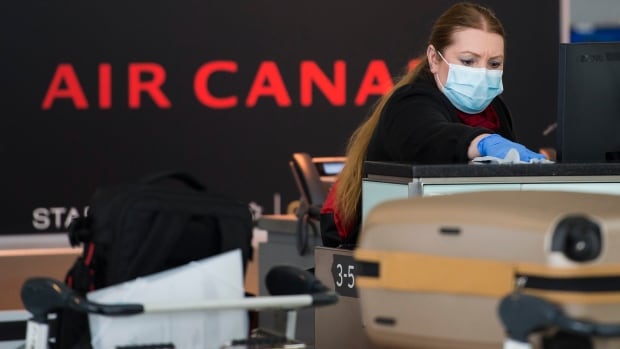The outrage sparked by a passenger incident involving a vomit-smeared airplane seat reflects a broader frustration with flight operations in Canada, travel specialists say.
Meanwhile, the country’s public health agency says it’s investigating the recent episode.
On Tuesday, Air Canada said it apologized to two passengers who were escorted off the plane by security after protesting that their seats were soiled — and still damp — ahead of an Aug. 26 flight from Las Vegas to Montreal.
“They clearly did not receive the standard of care to which they were entitled,” the airline said in a statement emailed to The Canadian Press. “Our operating procedures were not followed correctly in this instance.”
The Public Health Agency of Canada said it is in contact with Air Canada. It cited its mandate to ensure that anything brought into the country on conveyances ranging from planes to trains does not risk transmission of illnesses that can be spread via contact with bodily fluids.
“Blood, vomit and diarrhea may contain micro-organisms that can cause disease. These fluids, and the surfaces that come in contact with them, should always be considered as contaminated,” the agency said in a statement.
Plane never should have flown, aviation prof says
John Gradek, who teaches aviation management at McGill University, says the aircraft never should have been dispatched, given the “biological hazard” on board.
“What the heck are you doing?” he asked of the carrier. “Totally out to lunch.”
The outcry on social media sparked by the incident speaks to a degraded level of service perceived by Canadians after a year marred by frequent flight delays and lost luggage, said former Air Canada chief operating officer Duncan Dee.
“People’s patience is likely wearing thin,” he said.
“I think travellers can relate to those two travellers’ experience out of Las Vegas because they feel they’ve had their travels disrupted to a much greater degree than prior to (the pandemic).”
While photos of snaking lines and posts of passenger frustrations at Toronto’s Pearson airport popped up on social media over the summer, the chaos of overflowing terminals and luggage-clogged arrival areas that marked the 2022 travel season did not come to pass, due in part to more prepared players and fully staffed agencies and security contractors.
Nonetheless, Air Canada ranked last in on-time performance among the 10 largest airlines in North America in July, a report found. Canada’s biggest carrier landed 51 per cent of its flights on time that month, according to figures from aviation data firm Cirium.
“Last summer you had the three (largest) Canadian airports top the global charts for cancellations. This summer saw significant delays due to air traffic control,” Dee said. “The system simply has let travellers down.”
Of the latest incident, he added: “These seat cushions are removable.”
WATCH | From blood to vomit — who’s responsible for nightmare flights?
What recourse do you have if something goes terribly wrong during your flight? Andrew Chang breaks down a few gruesome examples of nightmare plane rides with some expert analysis on passenger rights.
Most airlines contract third-party “groomers” that clean the seats and aisles between flights and have access to spare cushions to replace soiled ones “in relatively short order,” Dee said.
“You’ve got toddlers, infants, even adults who have certain accidents … it doesn’t happen every flight, but it certainly happens every day.”
Tight flight schedule leaves little room for delays
But specialists say tight-packed schedules and flight delays squeezing turnaround times can put more pressure on crews to get back in the air as soon as possible.
“You’d be extending the ground time on the airplane to do the clean-up,” Gradek said, noting that crews have strict rules on their shift time, or “duty period.”
Last month’s incident wasn’t the first of the summer to involve seats and bodily fluids.
On June 30, a passenger on an Air France flight from Paris to Toronto said he sat amid the uncleaned remnants of a previous passenger’s hemorrhage, prompting a probe by the public health agency.
Of the latest incident, the agency said that if a complaint is determined to relate to a communicable disease “and the operator has not met the requirements of the Quarantine Act,” it could conduct an inspection and ultimately issue a fine to the operator.










